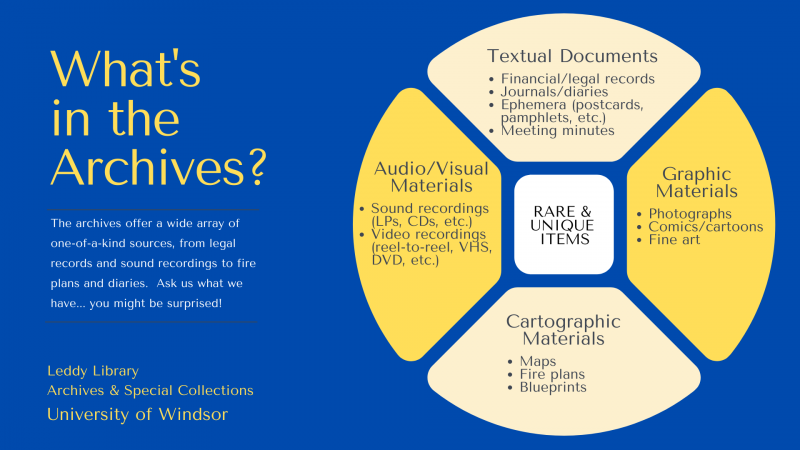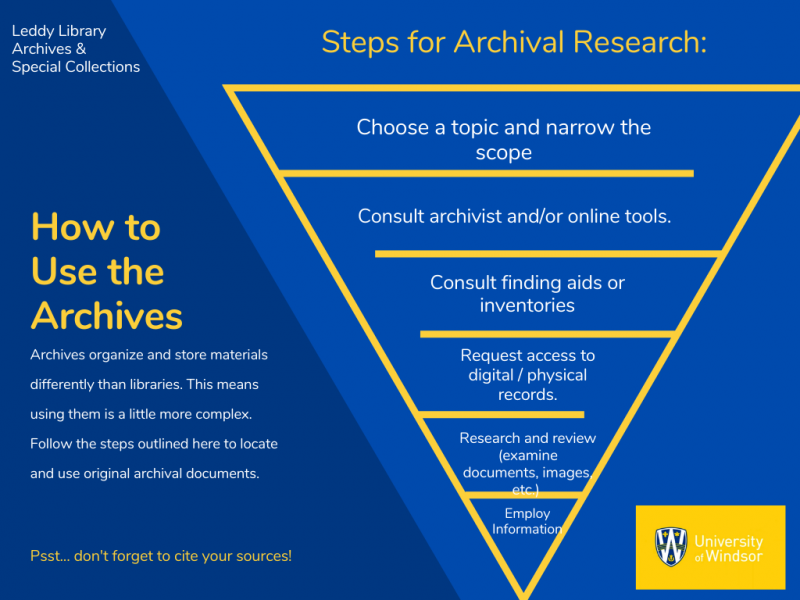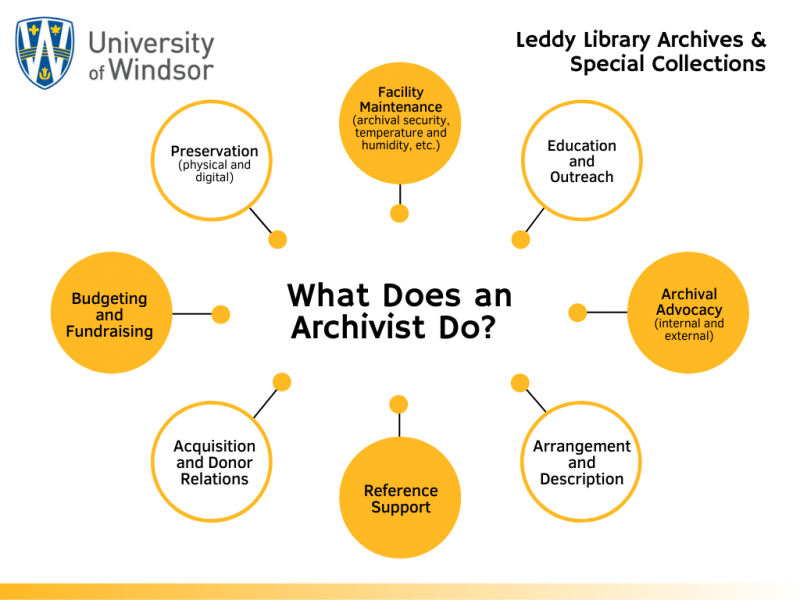- How to Use Archives and Special Collections
Archives and Special Collections has policies, practices, and terminology that differ from the rest of the library. Our staff spend their time in specific ways that may differ from other library staff. The resources below help explain the quirks and curiosities of our collections and our work.
How do I know what's in the Archives? How is it different from the rest of the library?
I'd like to use some primary sources for my project. How do I use the Archives for research?

I'm considering my career options. What does an Archivist do all day?
- Hours and Getting Here
Opening Hours
Archives and Special Collections staff are available Monday to Friday, 8:30am-4:30pm. During this time one or more archives personnel will be readily available by phone or email, and often in-person as well.
To consult materials and/or receive in-person research assistance: Our work often takes us to other parts of the campus or community, so we highly recommend that you schedule an appointment before visiting Archives & Special Collections. Providing 24-hour advance notice of your intended visit will allow us to retrieve and prepare the materials you would like see. Please contact us at archive@uwindsor.ca or 519-253-3000 ext. 3851 to discuss your research needs and/or to make an appointment for on-site research.
Getting Here
The Archives & Special Collections Reading Room, where we make our collections available for consultation, is located on the Basement level of Leddy Library’s Main Building, in suite G-100. As you exit the main stairwell or elevators, turn left and head down the corridor. Look for the blue signs on our brown metal door, on your left. Ring the doorbell to be let in. The Archives Assistant will be on hand to offer research assistance.
The Archivist's office is located across the corridor in office G-102A, off the Media Centre area in the Basement level of Leddy Library's Main Building.
As you plan your visit, you may find useful this campus map and this visitor parking information.
- Before You Arrive
In order to preserve our rare and fragile items from damage, theft, and pests, Archives & Special Collections applies a number of rules that must be adhered to by all visitors. Although they may at times seem inconvenient, they exist to protect items in our care which cannot be replaced. Staff therefore reserve the right to rescind the research privileges of anyone who fails to adhere to these regulations.
Rules for All Visitors:
- No food or beverages are allowed in the Reading Room, vault, or staff areas.
- Personal belongings, including backpacks and outer wear, are not allowed at the research table in the Reading Room.
Rules for Researchers Wishing to Consult Materials:
- Researchers must fill out a registration form.
- While consulting materials, researchers must surrender to staff some form of valid picture identification (such as a passport, driver’s license, or student ID). Additional identification may be required.
- Please ensure hands are clean before using materials.
- Handle books and manuscripts with respect and care. It may be necessary to place some items on specially designed foam supports while in use. This assessment will be carried out by the staff.
- Handle books and manuscripts no more than is absolutely necessary.
- Do not lean or place pressure upon books or manuscripts. Staff can provide you with appropriate weights to keep pages open.
- Do not lay books facedown.
- Do not use books or manuscripts as writing surfaces.
- Do not reorganize archival documents. Leave all items in the exact order in which they arrive.
- Use a computer or a pencil and paper for taking notes, or take digital photos (no flash). Ink pens, felt-tipped markers, highlighters, etc. are not allowed.
- Depending on the nature of the materials being viewed, researchers may be asked to use cotton gloves. These will be provided.
Staff will be available at all times to assist you. If in doubt, ask!
- Access and Restrictions
The items in our collections are intended for use, and we encourage you to draw upon them for information and inspiration! However, in some cases public access may be limited by government legislation, university regulations, or other considerations. These special cases include:
Official Records of the University of WindsorFor reasons of confidentiality, a small number of University records are restricted to use by approved units or members of the University. These records may become publicly accessible after a prescribed period of time has elapsed.
Works (Published or Unpublished) for Which We Do Not Hold Copyright
Due to their age, many items in our collections are now in the public domain and can be used and reproduced freely.
However, many other items we hold are still protected by Canadian and international copyright law. This includes both published works (books, pamphlets, etc.) and unpublished works (correspondence, notes, photographs, creative works, etc.). In such cases, it is up to the researcher to abide by the principles of fair dealing and copyright, in any use they make of the items.
Some donors have assigned their copyright to Archives & Special Collections as part of their donation. We will normally grant permission to use and/or reproduce these materials.
Materials Containing Personal Identifying Information or Personal Health Information
Under the terms of provincial and federal legislation governing freedom of information and the protection of privacy, some archival records may need to be reviewed and redacted by Archives staff before being shared with a researcher. This includes personal identifying information (dates of birth and death, contact information, etc.) and personal health information (health conditions, medical records, etc.) when these details are not already a matter of public record, and/or the individual has not given the Archives permission for this information to be shared. These types of information enter the public domain after a certain number of years, and at that time will be made freely accessible.
Restrictions Requested by the Donor
In rare cases, the donors of archival materials request that restrictions be placed on their donation – usually limiting access until after a certain year or limiting the acceptable uses of the material during the period of copyright. Such restrictions are conditions of the legal agreement transferring the materials to the possession of Archives and Special Collections and are strictly upheld.
- Camera Use and Reproductions
Digital Scans and Photocopies- Reproductions (digital scans or photocopies) of small amounts of our materials are available for a small (per-page) cost-recovery fee. However, we are not able to reproduce large quantities of material. Instead, we encourage you to visit in person to consult the material, or to hire a local researcher to do so on your behalf.
- Researchers are not allowed to remove items from the Reading Room in order to personally photocopy or scan them.
- Reproduction may not be possible for all items, due to the fragile nature of certain materials.
- Please contact us for current details of reproduction costs, methods of payment, and page limits.
Digital Photography
- Self-serve digital photography of our materials is allowed, but in order to avoid light damage to the items the flash must be disabled.
- Researchers must provide their own digital cameras, tripods, etc.
- An electrical outlet is available in the Reading Room for recharging purposes
Important Note on Use
- Any scans, photocopies, or photographs of materials still under copyright must only be used in compliance with the fair dealing provisions in the Copyright Act of Canada.
Contact Us
If you have questions about your upcoming visit to Archives & Special Collections, or wish to make an appointment to visit, please get in touch.By email: archive@uwindsor.ca
By phone: 519-253-3000 ext. 3851
In-person: Leddy Library (Main Building) basement, suite G-100

Connect with your library